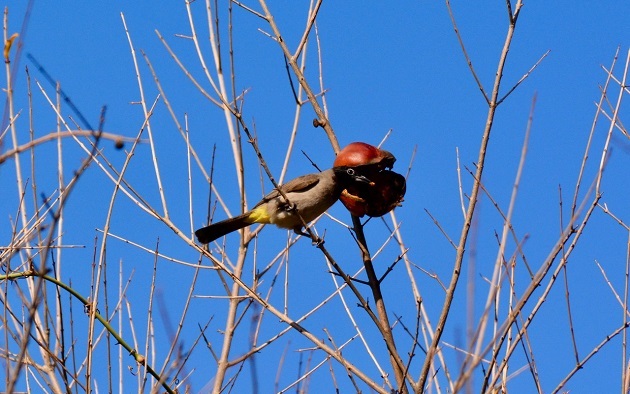How sad it is to have heard the word of God, and to allow it to be snatched away.
 Photo: Antonio Cruz.
Photo: Antonio Cruz.
The spectacled bulbul (Pycnonotus xanthopygos) is a very common bird in the Holy Land measuring 20 centimetres in length, and easily recognisable by its yellow tail feathers, its black head, and the thin white circle around its eyes. I photographed this one in Banias (Galilee) while it fed on pomegranates. It is this detail which identifies it as the grain-eating and fruit-eating bird like the ones mentioned by Jesus in his parables.
A sower went out to sow his seed. And as he sowed, some fell along the path and was trampled underfoot, and the birds of the air devoured it (Luke 8:5). The bulbul could perfectly well have been one of these birds, as they are native to Israel, and also to Lebanon, Syria, Turkey and Arabia. Now they can be seen in fruit plantations, gardens and cities.
Who was Jesus referring to when he said that those “along the path” are the people who hear the good news, but the word is then “taken away” from their hearts by the evil one? Perhaps he meant those who like to be open to all the currents of thought in this world, those who like to give everything a try, but don’t make their minds up about anything. They are ready to embrace every fashionable idea. They are open roads through which a wide range of ideologies pass continuously. Whatever is new fascinates them, but nothing really takes root in their hearts.
They are like the Epicurean and Stoic philosophers who brought Paul to the Areopagus because they thought he was a “preacher of new gods”, and asked him to tell them about “this new teaching that you are presenting”. Always running after the latest novelty. Infatuated by the latest religious fad. But when Paul dared to probe their consciences and spoke to them about the risen Jesus Christ, when he confronted them with the God incarnate in human flesh, but who had triumphed over death, when he placed them face to face with the mystery of Christ in such a way that they understood that they had to make a personal choice which would involve the commitment of their whole being, some of them mocked and others said: “We will hear you again about this”. That is the nature of the road-people. They hear, but they never commit themselves. They love first impressions, but they hardly ever identify themselves fully.
However, deep down they are very vulnerable. Their love of novelty often causes them to fall into the clutches of religious, political or social demagogies.
The Catholic theologian Manuel Guerra has identified up to 312 new religious movements in Spain [1], including the Mormons, Jehovah’s Witnesses, Moonies, the Church of Unification, Hindu and Buddhist sects, esoteric and gnostic groups, the New Age, the Age of Aquarius, etc.
All these groups have one thing in common. They have displaced Jesus Christ and replaced him with a human being. They are like the birds of the air that eat the seed of God’s word. The large black birds, the voracious crows and magpies that steal the message of salvation and prevent it from taking root in the heart of the hearer. They spin out arguments which seem novel, stating that Christianity is now outmoded. What is worse, many people believe them. How sad it is to have heard the word of God, and to allow it to be snatched away!
[1] Guerra, M. 1993, Los nuevos movimientos religiosos, EUNSA, Pamplona.

Las opiniones vertidas por nuestros colaboradores se realizan a nivel personal, pudiendo coincidir o no con la postura de la dirección de Protestante Digital.
Si quieres comentar o